Soldiers Not on the War Memorial
Rushden Echo, 1st January 1915, transcribed by Kay Collins
Promoted - Pte F Allen (Rushden), Oxford and Bucks Light Infantry, who enlisted in September, has been promoted to company clerk. His regiment is now stationed at Cranleigh, Surrey. We congratulate Pte Allen upon the recognition of his ability thus made.
|
The Rushden Echo Friday 8 January 1915, transcribed by Nicky Bates
Royal Gifts - Rushden Brothers at the Front
Pte George Line (Rushden), of the 2nd Northants, in a letter to his parents at Rushden says: "I had a big bar of chocolate from Mrs Sharwood on Boxing [day] morning, and it was grand. I had a grand time in the trenches on Christmas Day. I had bread and jam for dinner, and didn't much care about it. I got the parcel from you last week, and I soon got the contents down me. I had to go in the trenches that night and it was a cold sharp frost. I cannot feel my feet, they are so cold, and I cannot keep them warm, but there is not much mud about."
Pte Fred Line (Rushden), brother of Pte George Line, writes acknowledging receipt of a parcel and mentions that he is looking forward to the next. After asking for a pair of gloves he says: "I am sending the King and Queen's and Princess Mary's photo. Please keep them for me. We had a nice gift from Queen Mary and it had her photo in, a packet of fags, a pipe, and a packet of tobacco. I have come out of the trenches. I had Christmas in them. It was rotten, but roll on when it is over."
Pte Fred Line's sister informs us that a parcel containing gloves is on the way to him.
In another letter home from the front, Pte G Line (Rushden) says: "We had Christmas Day in the trenches and did not think much of it. But when we came out for three days, Tay (brother of Pte Line), and Zip (Pte A Lord, Rushden) and I went to the house of one of the Frenchmen and had a very good feed of boiled carrots, swedes, spuds, greens and a fowl. Zip was the carver. It was the best meal since we left home. The weather is rotten - it rains every day. I am writing this letter in the trenches and it is up to our knees in mud and water - enough to starve us. We came out the last day in the old year for three days and I hope when we go back it will be better. Tay is all right, so you need not worry. I think the war will soon be over."
|
| Rushden Echo, 8th Jan 1915
Private R Paragreen, motor driver in the Army Service Corps, son of Mr and Mrs J Paragreen, of Duck-street, Rushden.
|
|
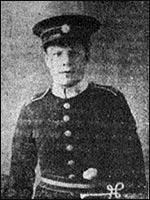 |
|
|
Rushden Echo, 22nd January 1915
Presentation
Mr Herbert Paragreen son of Mr and Mrs J Paragreen, of Rushden, a member of the Royal Naval Sick Berth Reserve who is now on service at the Haslar Hospital at Gosport, has been presented by his former fellow employees at the factory of Messrs Robinson Bros., with a handsome dinner service on the occasion of his marriage.
|
|
|
Rushden Echo, 8th January 1915, transcribed by Kay Collins
No Christmas Turkey – Lucky to Get Stew - Rushden Soldier’s Gratitude
After waiting for several months, Mrs Bayes, of Pemberton-street, Rushden, has heard from her son, Pte Q Bayes, who is at the front and who, as reported some time ago in the “Rushden Echo” had not written for months. He says, after thanking his mother for a parcel of eatables: “I hope you had a good time at Christmas. We could not get turkey for dinner out here and were lucky to get stew. But never mind, better luck next year.”
Private Bertie Bayes (his brother) is home from camp for three weeks holiday. see also his account of Mons
|
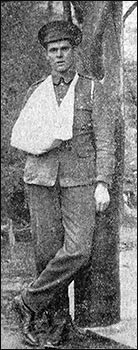 Rushden Argus, 8th January 1915, transcribed by Kay Collins Rushden Argus, 8th January 1915, transcribed by Kay Collins
Wounded Seven Times – Rushden Invincible Lives to Tell the Tale
Pte Parker, of Dell-place, Rushden, writes home to his mother, who is unfortunately ill in bed, concerning his wounds. He had hoped to come home, and was expected any time. The letter says: “I was coming home, but then they sent me to Woolton. My finger is very bad. I did not tell you at first because I thought it might upset you. Now I will tell you. I have been wounded seven times—twice in the fingers, once in the head, and twice in each leg.”
|
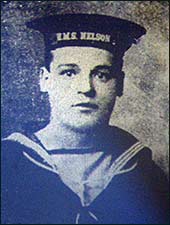 The Rushden Echo, 15th January, 1915, transcribed by Jim Hollis The Rushden Echo, 15th January, 1915, transcribed by Jim Hollis
Guarding The Nation’s Food - Rushden Sailor’s Work
News received on Monday from Stoker E. G. Letts (Rushden) states that he is in the best of health. No mention is made in his letter of the war. On his recent visit to his home he refused to be “pumped” even by his own friends. In reply to questions they put to him, he only said that they were getting their food all right, and must be content to know that he was helping to guard its arrival to England. After the war, he says, there will be much to talk about that must not be mentioned now.
|
The Rushden Echo, 15th January, 1915, transcribed by Jim Hollis
Rushden Seaman Not Idle - Ship Has Travelled 46,000 Miles - “As Happy as a Lark”
Seaman Cyril Groome (Rushden), of H.M.S. Berwick, writes a further letter to his parents and sister. He says:-
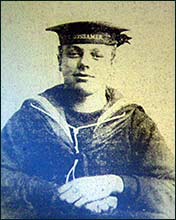 |
|
Seaman Cyril Groome
|
“I cannot tell you anything of what we are doing or what we have done, or where we are, because all our letters are censored before they leave the ship, so I shall have a book full to tell you when I come home. Sometimes it takes three months for a letter to come from England to where we are, because we are always at sea. I think our ship has travelled somewhere about 46,000 miles since we came out here, so you can see we have not been idle altogether. I am as happy as a lark, and we are anxiously waiting for our prey. I will tell you all about what we have done when I come home. We had a yarn about the ship that we have got to do another two years out here yet, so I don’t know when I shall be home. I shall be glad when the time comes because it’s too hot down here, and we are all the same as niggers out here because we have done 18 months in the tropics now, and I did six months before on the Cumberland, so I am getting rather used to hot weather myself. Well, we are all enjoying ourselves singing songs, It’s a long way to Tipperary.”
After asking whether the war tax has yet been levied, Seaman Groome continues:
“Never say die. We shall get over it or under it someday. I am in the pink, and shall be only too glad to meet the ‘German sausages’ as we call them, and they are nothing more.”
|
The Rushden Echo, 15th January, 1915, transcribed by Jim Hollis
The Famous Submarine B11 - Another Letter from A Rushden Hero
“The Germans won’t come out!” - Short Work If They Do
Still another letter of great interest comes from Seaman J. E. Buckle (Rushden), who is serving on board the famous submarine B11. Writing to Mr. Horace Wright, Portland-road, Rushden, he says:
“I received your welcome letter on the night before we made the raid, but you will have seen about that a lot before we saw it in the papers. I may say that none of us expected to return because it was a nasty place. Our captain knew what he was doing, although we were in danger all the time. Nine hours is a long time to be under water without seeing the blue sky or the country around us. I never expected to answer your letter, but, thank God, we are safe again for a time. We never know what the next day will bring.
“You were asking if we should get a chance to ‘wing’ the Goeben. Well, now you see we have made just as good a capture as if we had caught the Goeben,’ but you see they won’t come out. We had got to ‘dish’ them out, and a nice Turkey it was! I don’t think it will be yet awhile that the Germans will come out – they know a thing or two. It will be short work if they do, for we are up-to-date.
“So Sidney has joined the Army. Well, I wish him the best of luck. I see they want a lot more yet. I am glad to see that trade is good in Rushden.”
|
Rushden Echo, 15th January 1915, transcribed by Kay Collins
Rushden Pals Enjoy Plum Pudding Together
Pte G Savage (Rushden), of the 19th Hussars, writing to his parents, says: “I received the paper and I should like you to thank the “Rushden Echo” for putting such good news in as to people’s addresses, as it was the cause of my discovering the whereabouts of my chum Bill Chubb, to whom I have written.
Acknowledging a parcel sent to him by his mother, Pte Savage says: “We quite enjoyed the plum pudding, me and Patenall, as we are together, and also sleep together. It’s good to have a pal from your own town.”
|
The Rushden Echo, 22nd January, 1915, transcribed by Jim Hollis
Germans Cannot Land Here - Rushden Soldier’s Confidence
Khaki Lads Will Wreck Germany - As The German’s Would Wreck England - Home for August?
As announced in last week’s “Rushden Echo” Driver Frank Griffith (Rushden), of the A.S.C., had been to hospital. We are pleased to learn that it was for nothing worse than an attack of influenza, bad as that is, and he is not wounded. We are also pleased to know that he is now out of hospital again. Writing to the editor of the “Rushden Echo” he says: “It is very different out here from the life at home, and the sooner this war is over the better for all concerned. I am always delighted to read your very interesting paper. I am sorry to say that I have had an attack of influenza and am only just out of hospital. But I am getting on all right now and am not the only one knocked up. The weather is just beginning to tell on the soldiers and all hospitals are full of men with colds etc. When the warm weather comes you will see the Germans just about out of action. I think the war will last just twelve months from the beginning. Of course, I don’t profess to be a prophet, but, roughly speaking, I think we shall just be home for August Bank Holiday. The war might be over before then and it might last another 12 months from now. Everyone said we should be home by Christmas, but they did not say which Christmas! I believe this war will end as suddenly as it began. But, before that, England’s lads in khaki are going to make a wreck of Germany the same as Germany would make of England if they could only get there. You need not fear that as long as you remain in the dear old country. Big and strong as the Germans are, they are not strong enough to land a troop of soldiers in England. Wait until Italy starts, and then I should think we shall do more good work, especially if the Austrians give up. I think they are about wiped out, and now, like the Turks, they want to give us best. Kind regards for that well-known country town ‘off’ the map – Rushden.”
|
The Rushden Echo, 22nd January, 1915, transcribed by Jim Hollis
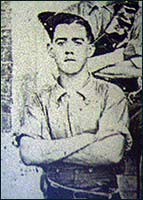 Rushden Soldier and The Turks - Beating Them All Along The Line Rushden Soldier and The Turks - Beating Them All Along The Line
The Turks have evidently had a rough time at the hands of the British, according to an interesting letter sent by Driver R. W. Long (Rushden), of the Royal Field Artillery. Writing to his parents he says: “A few hasty lines to let you know I am alive. I have passed under fire and a good many other things since I left…………. We are fighting the Turks in………………. I dare not say much about our position owing to the regulations. We have beaten them all along the line. A fortnight ago we marched into this place after driving out the enemy. We hoisted the Union Jack, and this is an important town too. I am boarding at present in a shelled and burnt-out customs house. Our force is still fighting up stream. I might mention that our battery was the only one in the big battle when we drove the Turks over the desert for 100 miles. We were in the midst of shell fire and it was horrible. Well, I will tell you all about it later.”
|
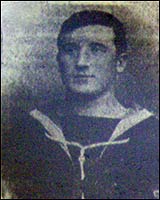 The Rushden Echo, 22nd January, 1915, transcribed by Jim Hollis The Rushden Echo, 22nd January, 1915, transcribed by Jim Hollis
The Turks Are Beaten and Give Themselves Up - Seaman’s Interesting Letter
Another interesting letter relating to the war against the Turks comes to hand from Seaman Douglas Barnes, Rushden, who was in those battles. He says:
“I think the war with the Turks here is finished, and we have seen them off. All that were left of them gave themselves up on Wednesday. Not one amongst us on board got a scratch, but the other ships had two killed and about seven injured, so I think we were very lucky. We had plenty of shells and bullets all round us, but only one hit the ship. A number of our soldiers were killed and injured. We all got off very lightly under the circumstances. It would have lasted a lot longer if our ships had not been there – the Turks could not stick them! I managed to get a few things of interest from the war, and shall bring them home when I get a chance. You need not worry about me. We are getting it a bit cold at night time.”
|
The Rushden Echo, 22nd January, 1915, transcribed by Jim Hollis
Rushden Prisoner of War - Cold and Hungry
Two letters from Private W. (Sedge) Sargent, of Rushden, who is a prisoner of war in Germany, have been received, this week, and apparently, he is allowed to receive parcels of food, clothing, and advances of money. Writing to his sister, Mrs. E. Dickens, of High-street South, Rushden, he says:
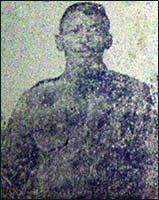 “Fellows here are receiving parcels every day. You might send me something to eat, as we do not get over much. Tell ‘Khaki’ I am in a nice fix. I was with him Christmas, 1913, but I shall not be this Christmas. This letter was started over a month ago, but I shall be pleased to hear from anybody who would like to write. I can only send two letters a month. I hope you will do your best, as you do not know what it is to be cold and hungry as we are. I had a nice birthday on Oct. 25. We were in the train coming here, with long faces, wondering what they were going to do with us!” “Fellows here are receiving parcels every day. You might send me something to eat, as we do not get over much. Tell ‘Khaki’ I am in a nice fix. I was with him Christmas, 1913, but I shall not be this Christmas. This letter was started over a month ago, but I shall be pleased to hear from anybody who would like to write. I can only send two letters a month. I hope you will do your best, as you do not know what it is to be cold and hungry as we are. I had a nice birthday on Oct. 25. We were in the train coming here, with long faces, wondering what they were going to do with us!”
In a letter to Mrs. Packwood, Pte. Sargent expresses pleasure that the “Rushden Echo” published his photograph, and, had circumstances permitted, would have liked a copy. But under German regulations this is impossible.
|
The Rushden Echo, 29th January, 1915, transcribed by Jim Hollis
Rushden Hussar at The Front - Always In Danger - Shells Bursting Around Aeroplanes
The Star Shells - Fifteen Shots a Minute
Pte. F. E. Sugars (Rushden), A Squadron, 19th Hussars, British Expeditionary Force, writing to his brother and sister-in-law under date Jan. 22nd, says :-
“To-day is an exceptionally good day for France. We had a bit of a frost last night and it was bitterly cold and wet, and, of course, we were on the old game tracking up and down the communication wire from the trenches looking for those artful devils to do their bit of mischief at night, when, I suppose, they think we should be sleeping. But, anyhow, it’s a rotten job, you never know when you are going to stop a spare bullet that comes flying along from a sniper or from the German trenches, and when the star shells come over you can see to pick up a pin almost, and then they don’t half let go, but, of course, our lads start slipping a few more into them, at the rate we have been trained to, viz., 15 a minute, and sometimes more than that, and they don’t like it at all, in fact they soon drop it, and so it goes on all night long.
“Though war is a terrible thing, it is a marvellous sight in this modern warfare, and though our lives are in danger at these times, one couldn’t help commenting on these subjects. During the long dark hours of the night, then again as soon as it is light, you can see shells bursting all round aeroplanes, and it looks marvellous how some of them escape being hit, but anyhow this king od thing is continually going on night and day, and I am sure I, for one, will be glad when it is all over so that we can come back to dear old England with you all once again, though, of course, we are close by in touch with you, as we get our letters and papers from you all in two or three days, and that is rather good. I am also receiving the good old “Rushden Echo” for which I must thank the Editor very much. It is very good of him to forward me a copy of his grand old paper to read news from the town I was born in.”
|
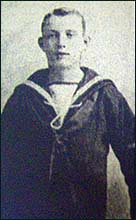 The Rushden Echo, 29th January, 1915, transcribed by Jim Hollis The Rushden Echo, 29th January, 1915, transcribed by Jim Hollis
The North Sea Fight - Three Rushden Sailors Engaged - Great Naval Battle
We are proud to know that three Rushden sailors were in the fight in the North Sea on Sunday. The one whose photograph we here publish, Seaman William Longland, son of Mr. and Mrs. Longland, of Wellingborough-road, Rushden, was formerly on the training ship “Impregnable,” but in August last was transferred to H.M.S. Lion, which was one of the participators in the great naval battle. It is not long since he wrote home and he was then in the best of health.
The others are Musician A. Smith, son of Mr. and Mrs. Smith, of East Grove, Rushden, and Stoker Ball, son of Mr. and Mrs. Ball, of Pratt-road, Rushden. We have recently published extracts from a letter sent home by Stoker Ball. The latter two sailors were on board the ship “Princess Royal.”
From the official lists it is clear that all the three Rushden lads are quite safe.
|
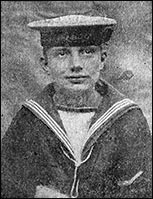 Rushden Argus, 29th January 1915, transcribed by Kay Collins Rushden Argus, 29th January 1915, transcribed by Kay Collins
We learn that two Rushden sailors were in the great naval fight on Sunday morning, when the German cruiser Blucher was sunk. Seaman William Longland, son of Mr. and Mrs. Longland, of Wellingborough-road, Rushden, was on the Lion, the flagship; and Seaman Smith, son of Mr. and Mrs. Smith, of East-grove, was on the Princess Royal in action. Seaman Longland left the training ship Impregnable in August to form the complement of the Lion. Mr. Smith was a musician on the Princess Royal, but, of course, acts as a fighting unit in war time.
|
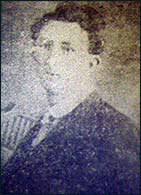 The Rushden Echo, 29th January, 1915, transcribed by Jim Hollis The Rushden Echo, 29th January, 1915, transcribed by Jim Hollis
A Rushden Telegraphist
Mr. William C. Taylor, son of Mr. W. H. Taylor, of High-street, Rushden, who had volunteered for service with the army as an office telegraphist in the Royal Engineers, leaves Rushden on Monday for the Birmingham headquarters. Mr. Taylor has been employed at the Rushden Post Office for nine years.
Mr. Edgar J. Deacon, of the Wellingborough Office, a friend of Mr. Taylor’s, also expects to leave next week to join the Royal Engineers as an office telegraphist.
|
The Rushden Echo, Friday 29 January 1915, transcribed by Nicky Bates
The Great Naval Battle - Four Rushden Men Engaged - The Sinking of the Blucher
The names of three Rushden sailors who took part in the great naval fight on Saturday are given on page 7 [Seaman Wm Longland, Musician A Smith, Stoker Ball]. A fourth Rushden man is Seaman William Knight of H.M.S. Tiger, son of Mrs A Dickens, of Rushden, who also participated, we understand, in last Saturday's naval engagement in which the German ship Blucher was sunk. Seaman Knight joined the Navy six years ago, when but 16 years of age, and received his training on H.M.S. Carnavon. He was transferred to H.M.S. Tiger when she was launched in September 1914. Seaman Knight, who is a native of Rushden, is 22 years of age. Up to yesterday his mother had received no communication with him since his engagement.
Since the engagement in the North Sea on Sunday, Seaman W Longland whose portrait appears on another page, had written home to say he was not amongst the wounded. There were 17 of his fellow sailors injured.
|
The Rushden Echo, Friday 5 February 1915, transcribed by Nicky Bates
The Naval Fight - Rushden Man on the 'Tiger'
Mrs A Dickens, whose son, Stoker W.T. Knight, of H.M.S. Tiger, participated in the recent naval battle in the North Sea, has received a letter from her son as fellow:-
"I am pleased to hear you are all right as it leaves me the same, and I hope you have all got plenty of work. I expect you have all heard about us being in action last Sunday, but we came out all right, after an engagement with the Germans for about four hours; you can tell what it was like, as you know, by the papers."
|
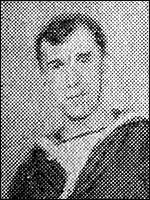 The Wellingborough News, Friday 5 February 1915, transcribed by Nicky Bates The Wellingborough News, Friday 5 February 1915, transcribed by Nicky Bates
On the Tiger - Rushden Stoker in Great Naval Battle
Appended is a portrait of Stoker William Knight, a Rushden sailor, who took part in the recent great naval battle. As reported in last week's issue, he has only been on the Tiger a short time.
A 'Tiger Hero'
Mrs A Dickens, of Rushden, has received a letter from her son, Stoker William Knight. As reported last week, Stoker Knight took part in the great naval battle recently fought in the North sea, and was on the Tiger. He writes to say that after four hours' fighting with the Germans he escaped uninjured, and adds "I hope to be home shortly."
|
Rushden Echo, 26th February 1915, transcribed by Kay Collins
Rushden Airman – At Home on Leave
Second-class Air-Mechanic Horace Waller, Royal Naval Flying Corps, son of Mrs. A. Waller, of Rushden, has been home on seven days’ leave after three months at the front. Our representative found him a very reticent young man, but extracted from him the information that he had been engaged in observation work behind the French lines. His duties are not exclusively confined to work in connection with captive balloons, aeroplanes, and dirigibles, but he also has to do with armoured trains and armoured motor cars. He entered His Majesty’s Navy 12 months ago last September, and received his training on H.M.S. Queen, being drafted to the air service last August.
|
The Rushden Echo, Friday 26 February 1915, transcribed by Nicky Bates
Rushden Soldier - Up to the Knees in Water
Pte Arthur Ward (Rushden), of the 2nd Northants Regt., who has been out at the front since October last, writes home to say he is quite well. He says he does not require anything only chocolate and fags, which he cannot get there. In a further letter he says:-
"I got your parcel quite safely and was very pleased with it. I admire the gloves very much, and the cakes were very nice. I had them for dinner, and they went down grand. I liked the chocolate very much and could do with some more. We are having very bad weather now. It rains and snows and then it freezes; the trenches are up to our knees in water, and we have to stand in it. It is simply awful to see it. Some of the fellows have frost-bitten feet, and can hardly walk. Some of us are covered all over with mud. I'm often in it and think of you when shot and shell in enormous quantities go by me, but it is no us grumbling, it has got to be done. I suppose you see the papers and read about us poor boys, who are nearly all like old men. I went and saw Vic Woods the other day. He is quite well and happy. I suppose we shall have a rest soon, when the other army gets out here, and then we might get round a bit."
In another letter he says: "I got the parcel quite safely and was very pleased with it. I had just come out of the trenches, so you can tell how I enjoyed the baked pudding. I had the rabbit's leg for my breakfast, and the chocolate was very nice. I had got such a very bad throat that the doctor said I must stop smoking, and my chest is so sore. I am just going to have a nice drink of cocoa now. It is lovely. It was so good of you to send me all that."
|
The Rushden Echo, 5th March, 1915, transcribed by Jim Hollis
Rushden Man - Enlists As A.S.C. Driver
Mr. Steve Dickens, of Glassbrook-road, Rushden, for six years in the employ of Mr. T. Swindall as horse driver, has joined the Army Service Corps, and left Rushden on Monday for Woolwich. He has a son at Weymouth in the Northants Regiment.
|
The Rushden Echo, 5th March 1915, transcribed by Jim Hollis
Rushden Soldier Acts Promptly
Rescue of a French Woman From a Canal
Two Bullets Through His Hat
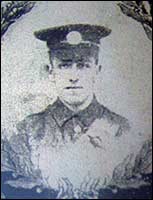 In a very interesting letter sent home that week, Private W. Austin, of the 1st Northants says:- In a very interesting letter sent home that week, Private W. Austin, of the 1st Northants says:-
“I made a name for myself the other night. I was on guard over a bridge that goes over a canal. From 9 to 11 I was posted there as sentry and about 10 o’clock a Frenchwoman jumped into the canal, trying to drown herself. I at once left the bridge and got her to the canal steps, about 50 yards from where she jumped in. With help from a French sentry I got her to the shore in safety. She was taken to a hospital, and afterwards an officer came along and took my name and regiment and said, you will hear more about this. Before she jumped in I had watched her for about 20 minutes, as, according to the law here, such persons ought to be indoors by 8 p.m. So I kept a sharp look-out. You see, I have done a good turn out here besides helping my comrades in front of the firing line.
“There was a fellow of the Black Watch who had been in front of us in the trenches and had lain in a wounded condition for two days. We got him into a place of safety but I never heard any more of him because there was no officer or N.C.O. in our trench. I think we were all lucky to get away from that place. I had two bullets go through the top of my hat but did not even touch my head.”
|
The Rushden Echo, 12th March 1915, transcribed by Jim Hollis
The Terrible Turk - Rushden Soldier in Warm Quarters
Dodging Shells - The Prowlings of Mosquitoes
A capital description of the battle with the Turks, recently announced by the Press Bureau, is contained in a letter sent home by Gunner R.W. Long, Rushden, of the Royal Field Artillery. He writes:-
“I am in very good health but it is somewhat impaired by the nightly prowlings of the poisonous mosquitoes. We have had another engagement with the terrible Turks, and I have managed to dodge the exploding shells, etc., once again. I was on picket the other night when 200 of the enemy got near our camp. It was like H… for an hour, and our poor fellows were hit by the bullets, as a good many were asleep in the tents. Even as I write, the cavalry have reported a force advancing and we are expecting an attack.
“We went out one day and blew up all the villages for miles round – they had previously been deserted, of course. We have tried to draw the enemy, but they are too cowardly to fight us. We nightly expect an attack.
“I often picture the time when we can all meet again at home and all of us who have been to the war recount his adventures. I have seen and done much in many lands in the short time I have been from home, and I have had the wish of my life gratified – that of adventures in foreign lands. I dare say that by the time this reaches you, I shall have moved either out of it altogether, or nearer to ………… The natives are not much in repute at present.”
|
The Rushden Echo, 12th March, 1915, transcribed by Jim Hollis
Rushden Soldier - Cycling and Dodging Shells
From some part of the war area, Private F. O. Long (Rushden), of the 2nd Northants, writes to his parents as follows:-
“I have got a change at last and a welcome one it is, although there is more danger than in the trenches. I have got a billet as dispatch rider to the General. My name was the first of the Company to be picked for the job when it became vacant, so I suppose I must consider myself lucky. It is quite exciting cycling about and dodging shells and hearing bullets whistle past and not knowing when I shall stop one. I would not miss it for a lot, but I shall not be sorry when it’s all over. Neither will anyone – Germans or Allies.
“The German soldiers are just as fed up as we are. We know because they told us.”
|
Rushden Echo Friday 12th March 1915, transcribed by Susan Manton
Rushden Man Fortunate - Only Five Uninjured out of Five Hundred
Pte. Dilley, son of Mr. and Mrs. Dilley, of the Mill House, Wymington Road Rushden, who recently visited home after been wounded at the front, was able to recount many interesting, not to say exciting experiences through which he had passed. After one engagement only five men were left uninjured out of a company of 500 and he was fortunate enough to be one of the five. After a restful time at home he left for --- from whence he expects again to go to the front.
|
The Rushden Echo, 12th March 1915, transcribed by Jim Hollis
Rushden Soldier Frostbitten
In a letter received this week, Private Q. Bayes (Rushden), now in hospital, writes:-
“I am in hospital with frost-bitten feet. It is a very painful thing, as you cannot get any sleep at night. There is nothing for it, but if you are in good health you will get better; if not, it takes a long time. There were 18 came down with me from the same trenches with frost-bitten feet. Most of them will get home. I might come home yet for a day or two. It will soon be March 17th; don’t forget to send me some cakes and chocolate.”
Pte. Bayes will celebrate his 21st birthday on March 17th.
|
The Rushden Echo, 12th March 1915, transcribed by Jim Hollis
Rushden Man in the Trenches - Three Days in and Three Out
Writing to his wife, who authorises us to publish the following, under date Feb. 23rd, Pte. E. King (Rushden), of the Steelbacks, complains about the rigours of the weather. It is very cold, he says, owing to the snow and rain.
They are still at the same old game, three days in the trenches and three days out. He will be glad when it is all over, as they never know if they are going to be hit when they go into the trenches at night. Before getting into the trenches they are under fire for about half-an-hour, so “have to face a bit of trouble.” He considers that his platoon is very lucky in getting in and out of the trenches. Under date March 2nd Pte. King says he is longing to see his wife and children again and that he is always thinking of them.
|
The Rushden Echo, 19th March, 1915, transcribed by Jim Hollis
Rushden Soldier Wounded - His Bible Saved His Life
“Only Thirty Yards From the German Trenches When I Got Hit.”
Mrs. E. King, of Rushden, has received news that her husband, Pte. E. King, has been wounded and is now in hospital at Shortlands, Bromley, Kent. Some interesting details showing how his Bible saved his life, are contained in a letter received by his wife this week. He writes :-
“Just a few lines to let you know that I am very comfortable and am going on nicely. We are having a good looking after here. The wound that I have got is in the right side. It is not very bad, just enough to get me here. I don’t expect I shall be in hospital above a fortnight, so I shall soon be at Rushden on a visit for a few weeks. Don’t worry about me, I shall be all right. The people here are very good to us, they are treating us all right, plenty of good food and fags. I got wounded on March 11th. We were in England and at Bromley on the 13th so you can see we were not long in coming to England. I think poor old---------has gone under. There were 12 of us in the trench that we dug at night. I think out of the 12 there were about three of us left. There was me and Green and another, that was all I had time to see, because the shots were as thick as rain. I don’t know how------got on because he was right on our right, away from us. We took the place and I got wounded on the day after at 2 o’clock. I was only 30 yards off the German trenches when I got hit.
“That Bible that I carry in my pocket saved my life, because the bullet hit that, and glanced off and went into my side. If it had not hit the Bible it would have gone through my chest.”
In a later letter dated March 16th, Pte. King says: “The wound is going on nicely and I expect to be with you in a fortnight if all goes well. I expect that Mrs.--------is looking out for bad news. Tell her that she must look on the bright side because he may have got through all right. I can’t tell you about him because he is in another company. Young Green (of Pemberton-street, Rushden, Ed.) is in another hospital, I don’t know where, somewhere about Bromley. If you see his mother you can tell her that he got hit on the hand. I think he will have to have his thumb off, that is all I can tell you. I shan’t want to leave this little hospital, they feed us up well. We have five meals a day. There are only 16 of us where I am and all belong to different regiments, except four of us who belong to the Northamptons.”
|
The Rushden Echo, March 19th 1915, transcribed by Kay Collins
Rushden Military Telegraphist - Keeping Open the Communications
Sapper F. A. Wills, of Rushden, who, on the outbreak of war, joined the 43rd Signal Company, Welsh Division, Royal Engineers, expects shortly to be called to the front, and has been spending a few days’ leave at home. His work will be that of a telegraphist. Before joining the Army he had been working at Northampton, prior to which he was employed at Rushden. He has undergone a good course of training, and has been stationed at Cardiff and then at Northampton, being now near Cambridge.
When he gets to the front he will be called upon to lay cables and keep open the communication between the headquarters of the General Staff and the divisional headquarters, and from there to the brigade headquarters. From the latter the messages are conveyed into the firing line by field telephones.
Sapper Wills and the rest of his company have been through a course of instruction in wireless telegraphy, and they have to be able to ride a horse, a cycle, or motor bicycle, and also to act as despatch rider in case they cannot get their communications through by ordinary means. A knowledge of map reading is also another necessary branch of their knowledge.
|
| See also an article in the Rushden Echo by Victor Marshall Moon 19th March 1915 |
Rushden Echo, 26th March 1915, transcribed by Kay Collins
Wounded Rushden Soldier – Now at Higham Ferrers V.A.D. Hospital
Pte. F Munday (Rushden) of the Beds regiment, son of Mr and Mrs A Munday, of Rushden, who was wounded in the wrist in November last, and who has been in hospital at Tonbridge Wells for nearly five months, has now been transferred to the V.A.D. Hospital at Higham Ferrers, where he arrived last Tuesday. He is delighted at getting so near home. Pte. Munday was called up as a reservist in August, and after about one month’s training was sent to the front with his regiment. He received his wound at Ypres. Although it is four months since he received his injury, his arm has by no means healed, and it is still found necessary to insert a tube in his arm.
|
The Rushden Echo, 26th March 1915, transcribed by Jim Hollis
Rushden Soldier Wounded and Brother Suffering From Frostbite
Pte. E. King In Hospital - Waited On Hand And Foot
Pte. E. King, of the 2nd Northants Regiment, who, as we reported in our last issue, is wounded, in further letters to his wife, writes:-
“I have heard that Fred (his brother, Pte. F. King, of the Duke of Cornwall’s Light Infantry) is in hospital with frozen feet in Rouen. France. He tells Sarah (his sister) that he will never forget the first time going in the firing line. He is better off in hospital than up the front because it is horrible there. It is only a small hall we are in here, but they are very good to us – they will do anything for us. I daresay I shall be here for another three weeks or a month. The doctor is very good and goes all he can for us. I asked him to let me get out of bed to-day, but he said ‘You have to stop there until the wound heals up a bit, and that will be another fortnight,’ I shall be glad when I can come and see you all.”
In a later letter he says:-
“I wish I was in Rushden. It is Saturday night, but, never mind, I daresay I am just as well here at present. I wish it would get a bit warmer, then the wound would heal up quicker. Just think of me lying in bed, having servants to wait on me, bring the water to wash with night and morning, and five meals a day. It is all right, I can tell you, but I could like it better if I was allowed up – it makes you so weak to lie in bed all the time. We have got the parson here to-night and they are going to give us a concert. So, you see, the people here a making a proper fuss of the soldiers. I will give them credit because they are very good round here, apples and pears, everything that you can mention. We had rabbits for dinner to-day, eggs for breakfast, so you can see they are feeding us up well. I see by the paper that 17 of our officers are in the list of honours, two of my company.”
|
The Rushden Echo, 26th March, 1915, transcribed by Jim Hollis
Rushden Soldier At Home - Frostbitten Feet
Pte. Albert Glenn, 2nd Battalion, Gloucestershire Regt., eldest son of Mr. and Mrs. F. Glenn, of Wellingborough-road, Rushden, is at home on 14 days’ leave, having sustained frostbitten feet whilst at the front.
|
The Rushden Echo, 26th March 1915, transcribed by Jim Hollis
Rushden Soldier In Hospital - Frostbitten Feet
We learn that Private Fred King (Rushden), of the 2nd Batt. Duke of Cornwall’s Light Infantry has had to be taken to hospital, suffering from frost bitten feet. It may be remembered that Pte. King was interviewed by the “Rushden Echo” recently during his stay in Rushden. He had been seriously ill with an attack of pneumonia just after his arrival in England from China. On his recovery he went to the front with the D.C.L.I.’s but was not in the fighting line for long before he was frostbitten. His letters were not of a very communicative nature as regards the affairs of the war, but were very cheerful in tone. One of his last letters, written from a hospital, stated that he was going on all right and hoped to soon be out.
Pte. King has been in the Army about seven years and has been to South Africa and China. He was at the later place when the war broke out.
|
The Rushden Echo, March 26th 1915, transcribed by Kay Collins
Recruit
Mr. H. Swindall, son of the late Mr. Swindall, booking agent, of Moor-road, Rushden, and nephew of Mr. T. Swindall, has enlisted in the 2nd Contingent of Canadians. Mr. H. Swindall is leaving behind a wife (eldest daughter of Mr. J. Noble, late of Rushden), and one child.
|
| The Rushden Echo, April 2nd 1915, transcribed by Kay Collins
Rushden Soldier Wounded - Brothers at the Front
Private Archie Green Injured – Bullet Wound in the Hand
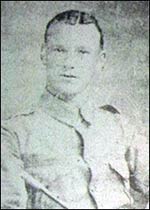 Mr. and Mrs. Charles Green, of Rushden, have received news that their son, Pte. Archie Green, of the 2nd Northants Regt., has received a gunshot wound in the thumb of the right hand, and is now in the Red Cross Hospital, Beckenham, Kent. He received his wound on March 13th. In a letter to his mother, written by a comrade, he says: “I am getting on as well as can be expected now. The hand is not so serious as I at first thought. The bullet went in the top joint of the thumb, through the middle joint and then along the palm. Mr. and Mrs. Charles Green, of Rushden, have received news that their son, Pte. Archie Green, of the 2nd Northants Regt., has received a gunshot wound in the thumb of the right hand, and is now in the Red Cross Hospital, Beckenham, Kent. He received his wound on March 13th. In a letter to his mother, written by a comrade, he says: “I am getting on as well as can be expected now. The hand is not so serious as I at first thought. The bullet went in the top joint of the thumb, through the middle joint and then along the palm.
Gunner L. Green (brother of Pte. A. Green), of the R.F.A., writes under date March 16th:- “I am sorry to tell you Arch has just been wounded, but I glad to say it is not very bad. I was just behind him. I never saw him, but I was told by Jim Prestage, who comes from Rushden, that he has gone to hospital. I am quite well myself. I suppose you will get a letter from Arch soon. You can tell him I was just behind him, I just missed him by two hours before he got in the trenches. Mind you, I am not certain of this, but it came from a chap who was in his platoon. They are doing some good work now.
Pte. T. Lee, brother-in-law of the above two soldiers, writes to his wife under date March 21st:- “You say Arch has got wounded. He is better off than we are, that is, if it is not too bad, so you need not worry about that. I am all right. I keep going in the trenches and coming out, so as long as I keep doing that I shall be all right. Keep a good heart, the same as I do, and we shall see one another in time to come. When I came away I did not think I should be away as long as this, but what is to be, will be. The sooner it is over the better. The weather has changed again. When we were in the trenches this time it snowed and it was colder than at Christmas, but spring has come in now and it has come in lovely. They will not let us send parcels home. I was lucky to get the Princess Mary gift home. But roll on when they send me. That will be a good parcel for you, I think, and there will be a day when it is all over. Just remember me to Fred Bass. I wish I was with him, as France is no place for me”.
Mr. and Mrs. Green have another son, Walter Green, who joined His Majesty’s Navy a fortnight ago.
|
The Rushden Echo, April 2nd 1915, transcribed by Kay Collins
Rushden Lancer Disabled – Within 15 Yards of the German Trenches
Five days and night in the trenches at a stretch, with water almost up to the thighs at times, has been the experience of Lance-Corpl. Sidney Knight (Rushden), of the 5th Lancers. He is now at home on leave of absence, after being in hospital with frost-bitten feet. [part of a longer article - see conditions in war]
|
Rushden Echo, 9th April 1915, transcribed by Kay Collins
The Sportsmen’s Battalion – Rushden Recruit in Training
Pte. F E Preston (Rushden), Sportsmen’s Battalion, writes to us from Essex as follows:-
"I am always anxious to know how things are progressing in Rushden and still hope to keep in touch with it. I trust the Scouts are going along all right, and are keeping together. We have been down here about three weeks. It is a beautiful place, and the camp is well organised, the huts being well fitted up and the food good, with plenty of it. They are putting us through fairly stiff drills, field work, and route marches. It is said that we shall soon be leaving for abroad."
|
The Rushden Echo, 9th April, 1915, transcribed by Jim Hollis
Wounded Rushden Soldier - Arrives in England
Pte. J. Farrar (Rushden), who has been wounded, is now in England. Writing on April 3rd to his parents, Mr. and Mrs. Farrar, of Crabb-street, Rushden, he says: “My leg is a bit painful, but I am making the best of it. I am on the water, not a great way from good old England. We expect to get there very shortly. I don’t know what hospital I shall go to yet, but I will let you know as soon as I can. Dr. Greenfield was all right when I left him. I never saw Ern Hodson; if I could have walked I should have found him. I would like to get to Higham Ferrers hospital, that would be grand for all of us. We got a hot cross bun for tea; it was grand.”
In a letter dated Easter Sunday from the 2nd Northern General Hospital, Leeds, he says: “I am getting on all right and in the best of health, though my leg is still a bit painful. I am very pleased to get to England. The hospital here is all right. There are seven of us in the ward, all wounded.”
|
The Rushden Echo, 9th April, 1915, transcribed by Jim Hollis
Rushden Soldier Wounded - Shot in the Left Hand
The Battle of Neuve Chapelle - “Lucky To Get Off So Well”
We are sorry to report that Pte. George Stevenson (Rushden), of the 2nd Northamptons, son of Mr. and Mrs. George Stevenson, of John-street, Rushden, was wounded in the Battle of Neuve Chappelle. He is now in the Beckenham Red Cross Hospital, Kent. Writing to his parents, he says he is getting on finely. He received a gunshot wound in the left hand, and he thinks himself lucky to get off so well, as he was in the charge when they took Neuve Chapelle at the point of the bayonet.
“This,” he writes, “was a grand move which we made. We also took three rows of trenches by night-fall. You will see how our regiment suffered, along with other regiments. I was wounded on the morning of March 11th, and could not get out until dark. We had no food nor water that day. When I left, the battle was still raging, as the Germans were trying to retake the place. I lost most of my pals who went into the charge with me, as they fell all round me as we ran.”
Pte. Stevenson, who is 19 years of age, was a well-known local footballer, and played for Rushden Windmill, but he had signed on to play for Irthlingborough Town in the 1914-15 season. When war broke out, he enlisted – in August – in Lord Kitchener’s Army, and went to France in January. Before joining the Army he worked for Messrs. Cunnington Bros., boot manufacturers, Rushden.
|
The Rushden Echo, 9th April, 1915, transcribed by Jim Hollis
Rushden Soldier - Poisoned by Germans
Pte. E. Pettit (Rushden), who formerly worked at the M.R. Station at Rushden, and lodged with Mrs. Ambridge, of 5, Grove-road, Rushden, has met with ill luck. He joined Kitchener’s Army, and went out to the front in due course with the 2nd Northamptons. He is now in hospital at Weymouth, suffering from a bad arm, made worse by the fact that the Germans poisoned some water at ******, and he was unfortunate to take some of the poison. He is now making good progress.
|
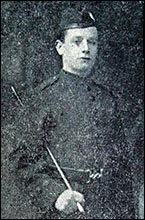 Rushden Argus, 9th April 1915, transcribed by Kay Collins Rushden Argus, 9th April 1915, transcribed by Kay Collins
Rushden Rifleman Wounded
Mr. and Mrs. A. E. Laughton, of have received a letter from the War Office stating that their soldier son, Private A. Laughton, of the 2nd Scottish Rifles, has been wounded and is now at the hospital at Rouen. He has a gunshot wound in the thigh, received in action on March 12th. The wounded man is only 19 years of age, and enlisted when he was 15½ years. He was five months in the Northamptons. He served twelve months at Malta, coming to England in September last. He was four days at home, and then went to the front in October.
|
|
The Rushden Echo, Friday 16 April 1915, transcribed by Nicky Bates
Thrilling Story of Hill 60 - Sixteen Tonnes of Dynamite - Arms and Bodies Shot into the Air
A Rushden "Will-o-the-Wisp" - Gunner Tom Clark's Narrow Escape
Yesterday (Thursday) Mr and Mrs Charles Clark, of Irchester-road, Rushden, received from their son, Gunner Tom Clark, of the 4th Battery Motor Machine Gun Service, with the British Expeditionary Force, the following thrilling letter.
"At last we have been in action and now, after three days in the trenches, I am back in my hayloft, sound and fit for a few days' rest before going up again.
"The British were to capture some important trenches, and we took up our position ten minutes before the attack began. Suddenly, a hill called No. 60, occupied by Germans about 50 yards from us, was blown up by 16 tonnes of dynamite. It was a terrible sight, arms, bodies and rifles shot up into the air, and our gun pit swayed to and fro.
"Our lads then made a great bayonet charge and took the trenches, and an hour afterwards the Germans made a counter attack, and that is where we came in. Directly the Germans left the trenches we opened fire, and as an officer told our captain, literally mowed them down like corn.
"At the time the shell fire was hellish. Shrieking shrapnels were bursting all around us, and three times in succession my gun was knocked off the parapet, but I escaped unhurt. At last a big shell hit the top of the trench, and with a roar in came the side of the trench, burying me and a pal, but once more we scrambled out unhurt, although four of our fellows were wounded, and out of action.
"Well, I can't tell you much more about it, but it is sufficient to say that our battery, the first time in action, is to be mentioned in dispatches.
"Received the eggs and cakes quite safely."
Gunner Clark, who is 19 years of age, enlisted last September in the Royal Field Artillery with Corporal Don Patenall, and he was sent to Kildare in Ireland. There he was selected for the Motor Machine Gun Service, and has been "somewhere in France" for about a couple of months.
Private Charles Harold Clark, his elder brother, who had done three years in the Yeomanry, enlisted in the Royal Field Artillery about a month ago and is now in training.
Gunner Tom Clark, in a previous letter from the front, says:- "I am writing this letter whilst sitting under a hedge about 2000 yards from the German trenches, which through the glasses one can see quite plainly. For the last week we have been just behind the firing line, on the look-out for German aeroplanes, and, although, we have not fetched one down, we have turned several back, and prevented them from taking observations.
The last day or two, shells have been whistling over us all day long, and yesterday one dropped about 100 yards away, and 'didn't the muck fly?'
"The other day we had been digging gun-pits, and an hour after we left for home a shell struck the trench which we had been digging, killing seven and wounding 20 of the Warwicks.
"Thanks for the paper. I see that several Rushden lads have gone under recently."
"At 3.15 a.m. Wednesday morning two shells were dropped onto the town where we are billeted, but only wounded two men. The Germans have just now commenced to shell the road a little to our right, and it is the road we have to go back along and the shells are whirring like a flock of ducks flying.
"But I shall have to conclude now, for bread and bully beef has just been shouted, so good-bye.
"P.S. Just as I was finishing this letter a big shell dropped about 150 yards away and dissolved a cottage - only one wall left".
|
The Rushden Echo, 16th April, 1915, transcribed by Jim Hollis
Rushden Sailor at Work Hopes The War Will Not Last Long
Next August or September? - The German Ships “Have Had Enough of It”
Seaman Cyril Groome (Rushden) of H.M.S. Berwick, writes to his parents and sister at Rushden as follows:-
 |
|
Seaman Cyril Groome
|
“Just a line to let you know I’m still alive and happy. I am writing to you as often as I can, but hope you know we are not the same as Home Fleet, because we cannot write every day the same as they can. We have got to be satisfied with writing once a month. Well, we are in the midst of cold weather, so you can thereabouts guess where we are. I received yours and Len’s parcel quite safely and the contents were grand and very, very ‘more-ish,’ especially the mince pies. We do not scrub decks now because as soon as you put the water on the decks it is frozen, so you can guess what it is like where we are. We are not allowed to tell you where we are or where we are going, because every letter I send to you is censored by our officer on board before they are sent to England.
“I cannot say when the war is going to finish, but I hope it won’t be long because I’ve had no proper sleep since the war started, and I am sure I shall be very glad to see you all at home if I ever reach there. Of course, I might never come home again, as you know what war is. You never know when the end is coming. We are not the same as soldiers as they can have a chance to run, but we have no such chance. We have got to fight until the ship is under the water, and then I can assure you we don’t get much chance to swim because the ship would draw us down with it.”
In a later letter he writes:- “We are still alive and happy. I have no fresh news to tell you this time. They think that the war will be over about August or September next, and I shall be glad when it comes, I can tell you. I have no fresh news, as the German ships have just about had enough of it.”
|
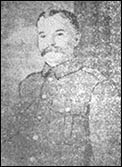 |
|
Pte. Charles Bishop
|
The Rushden Echo, 16th April, 1915, transcribed by Jim Hollis
Rushden Soldier Family - Two Brothers with The Colours - One a Prisoner
We publish herewith a portrait of Pte. Charles Bishop, of Rushden, who has joined the 3rd Northamptons, and is at present at Weymough. He expects to go to the front very shortly. Pte. Bishop has two stepsons in the Army – Pte. Herbert Whiting and Pte. John Whiting.
Pte. H. Whiting, 3rd Northants, is now a prisoner of war at Gottingen, Germany. In a letter to his mother he says he is quite well, and is waiting for another parcel. His mother had sent him a parcel before receiving the letter, and we hope he has safely received it by this time. Mrs. Oliver Claridge has also kindly forwarded him very acceptable parcels of goods.
Pte. John Whiting, his brother, is in Lord Kitchener’s Army. He is now at Aldershot and expects to go to the front very shortly.
|
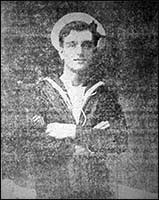 The Rushden Echo, 16th April, 1915, transcribed by Jim Hollis The Rushden Echo, 16th April, 1915, transcribed by Jim Hollis
Rushden Sailor at Home After The Great Naval Battle
Signalman J. W. Robinson (Rushden), of the destroyer Lucifer, son of Mr. and Mrs. W. S. Robinson, of Rushden, has been home on four days leave. It will be remembered that Seaman Robinson, on his last visit home last November, accorded a representative of the “Rushden Echo” an interview that made interesting reading. Since that time he has passed through many more thrilling experiences, having participated in the great naval engagement in the North Sea. Owing to the confidential nature of his work, signalman Robinson preferred not to talk about what he had done.
|
The Rushden Echo, 16th April 1915, transcribed by Kay Collins
Horse Shows on Active Service – Rushden Soldier Wins a Prize
Writing to his mother and father, Pte Albert Allen (Rushden), says:-
“Just a line to let you know I am still quite well and getting on O.K. I hope you are all well at home. I would have liked to be with you, but my luck is out this time; I don’t suppose I shall get a chance now until the war is over, and I don’t know when that will be. We don’t seem to be doing much, not the Cavalry, but I did hear that we were going to form our Regiment up again, but I cannot say how true it is yet.
“We had a horse show out here at Easter; it was for wagons and horses, so I went in for it with my pair of horses in my ammunition cart. I took third prize, so I did not do so bad. There were some very good turn-outs, I can tell you, but fancy having horse shows on active service! We are having some funny weather just now. I hope it will soon be fine, so that we can lay out again at nights. I had a good birthday and the parcel was all right, so was the cocoa and chocolate, and I thank you very much for all.”
|
Rushden Echo, 16th April 1915, transcribed by Kay Collins
Rushden Soldier Wounded
Pte Jack Farrer in Hospital – Another Operation
Pte. Jack Farrer (Rushden), writing from the northern General Hospital, Leeds, to Mrs James Sykes, of Rushden, says:-
“I am getting on slowly, but I think they have got all the shrapnel out this time. I was cut again on Friday, and had to go through some pain on Saturday. I would not have believed there was any pain like it, but my leg is a little better today. I think it will take me about six weeks to get better, but it is no good worrying in time of war. I am just as well here as in France. I am going to be a home bird after all this.”
|
The Rushden Echo, 16th April, 1915, transcribed by Jim Hollis
Rushden Soldier Still Alive
“A Long Way Off Dead Yet” - A Right Good Easter
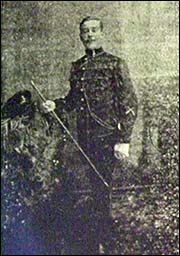 |
|
Pte F Sugars
|
Pte. F. Sugars (Rushden), of the 19th Hussars, writing from the front to his parents at Rushden says:-
“I should be pleased if I was back with you out of this, but I expect the day will come if I wait long enough. I am still living and am pleased to think that I am a long way off dead yet, sticking it like a brick.”
In a letter to his brother (Mr. Ernest Ayres), after thanking him for a parcel he has received from him, he says:-
“There is nothing you could send better than something to eat and drink, and then a good smoke after it. I have been well off for parcels this last week or so, yours making the fourth during the past week, so under the present conditions I am having a right good Easter, and to-morrow, all being well and things go on as they are, we are going to hear the Bishop of London preach; what a change that will be, quite a treat for us. We shall fancy we are back home again; don’t I wish we were. We have had some bitter cold winds here, and all the time a lovely sunshine, but this past four or five days have been lovely, something I should say, after the style of sunny France for a wonder, but the weather can’t be relied on yet. Thank God, I have come through so far and I trust I shall do to the end, then I shall be satisfied.”
|
The Rushden Echo, 16th April, 1915, transcribed by Jim Hollis
Rushden Soldier Wounded - Injured In The Arm - Six Weeks At The Front
Pte. Sidney Wright, of the 1st Northants Regiment, son of Mr. and Mrs. Eli Wright, of Harborough-road, Rushden, has sent home to say that he was on Friday last wounded in the left arm. The particulars given are very scant, but it is presumed that the wound was caused by a bullet, as he states that it is “not much more than a broken arm.” He is now in a hospital in Kent.
Pte. Wright, who enlisted at the beginning of September, has been at the front for about six weeks.
|
The Rushden Echo, 16th April, 1915, transcribed by Jim Hollis
Rushden Soldier in Hospital - Well Looked After
Bombardier Harry Francis Newell, son of Mr. and Mrs. F. Newell, of Washbrook-road, Rushden, who is now in the V.A.D. Hospital, Chester, writes: “I am now able to keep up all day and get about nicely, but they won’t send me from here yet, they will keep me another month at least, as I was so run down. If you had seen me after I came home you would not have known me, I was so thin. Now I am on convalescence, to get my strength back and to get some flesh on me. On Thursday I spent part of the morning and the afternoon with the Countess Grosvenor, and had dinner and tea with her, and a motor drive round the country, and gathered flowers round her grounds. We had a fine time; she is a dear lady, and no one can help but be at home with her. She has lost her husband and son in the war. After tea she went with us to Eaton Hall, one of the most magnificent buildings in England, belonging to her son, the Duke of Westminster, and we spent the evening there. Lady Grosvenor gave me a present, a very nice book, and a photo of her home, the castle.”
|
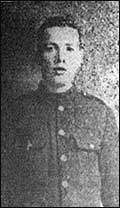 |
|
Pte F Clayton
|
The Rushden Echo, 16th April, 1915, transcribed by Jim Hollis
Rushden Man’s Lucky Escape - Wounded in The “Pack”
In a letter to his parents, Private Frank Clayton (Rushden), of the 1st Suffolks, states that he has had a fortunate escape from injury. He says:-
“I had a narrow escape the other night, a bullet going straight through my pack. I told Fritz to have another go.”
We are pleased to be able to relate the rumour that Private Clayton had been wounded, and congratulate him on the fact that the bullet did not go straight through his back.
As will be remembered, Sergt. Samuel Clayton, brother of Private Frank Clayton, was killed in the early stages of the war.
|
The Rushden Echo, 16th April, 1915, transcribed by Jim Hollis
Rushden Officer Wounded
A Steelback Non-Com. Receives His Commission
What the German Trenches Were Like
German and British Aviators Contrasted - What a Bombing Party is Like
Large numbers of recruits are still wanted, said Second-Lieut. J. W. Hillyard to a “Rushden Echo” representative. “The Old Army has been flattened out to some extent, and young men are now required.
Lieut. Hillyard, of the Royal Berkshire Regiment, was for 17½ years in the 58th (the 2nd Northamptons, known familiarly as the Steelbacks). Various promotions have come to him, and at the time he received his commission on Nov. 4th, he was Company Sergt. Major in the Steelbacks, the Commanding Officer selecting him and Company Sergt. Majors C. Belding and E. Campling, of the same regiment, for Lieutenancies. Lieut. Hillyard was a Bedford man, but his father and mother were Northamptonshire people. He is a cousin of Mrs. Nicholls, of Kings-road, Rushden, and a nephew of Mrs. Patterson, who lives with Mrs. Nicholls, her niece. During the war, Lieut. Hillyard is making his home in Rushden, his wife and children lodging with Mrs. Smith, of 104, Portland-road, Rushden. He has one son attending Wellingborough Grammar School.
On the declaration of war, Company Sergt. Major Hillyard – as he was then – came back to England with the Steelbacks from Egypt, and on receiving his commission he went to the front to join the Royal Berkshires. He was in the trenches for a time, until they moved to the battle of Neuve Chapelle.
“By a very strange coincidence,” he told our representative, “we took up in the general advance the trenches which had been occupied by the Northamptons. The bombardment and advance began on the morning of March 10th. We had to get over the three German trenches and hold the position that had been indicated to us beforehand. When we got into the trenches we held the position, and afterwards another regiment came through. This was right at the edge of Neuve Chapelle. I had orders to stay there. We were in the very centre of the attack, and in the front trench. In getting into the first three trenches we unfortunately lost our captain, two subalterns, and 50 men, and I, as the senior officer left, had to take command of the company. I carried on the company until the evening of March 12th, when I got hit myself, and then I came in the ordinary way through the clearing hospitals home.
We were on the German side of Neuve Chapelle when I was wounded. I received four wounds in the right arm – two in the upper arm and two in the forearm, the larger bone being fractured. I was sent to the Baroness de Goldsmith private hospital, 35, Chesham-place, London, and am in Rushden on week-end leave.
“What is your opinion of the German soldiers?” asked our representative.
“The Germans are good fighters,” replied Lieut. Hillyard, “and they are very well looked after. Judging from the German trenches we occupied, they seem to have plenty of luxuries. They are well clothed and amply fed, except that their bread is coarse. I brought away a piece of……., but I didn’t eat it, I wasn’t hungry enough!
“The English soldiers are in splendid condition – of fine physique, strong, and healthy.”
|
The Rushden Echo, 23rd April, 1915, transcribed by Jim Hollis
Rushden Soldier Wounded - Injured At Neuve Chapelle - Now Getting On Nicely
Pte. Arthur Newell (Rushden), of the 1st Northants Regiment, has written home to his parents, Mr. and Mrs. F. Newell, to say that he has been wounded in the left arm, and is now in hospital at Sandgate, Kent. In his letter he says:-
“I am not allowed out of bed yet. My arm is getting on well, considering the case. It has been cut to the bone and I have it dressed four times in the day and once in the night. I will tell you how it happened when I can use my left hand, as my paper keeps slipping. We get good food here. I was wounded at Neuve Chapelle on April 12th.”
Pte. A. Newell is a brother of Bombardier Newell, whom we reported wounded some weeks ago, and who is still in Chester Hospital, but progressing favourably, we are pleased to say.
|
The Rushden Echo, 30th April, 1915, transcribed by Jim Hollis
Rushden 'Mill Footballer
On Active Service - With the Telephones - On the Headquarters’ Staff
A Tribute To The Officers
Private Herbert W. Wilson, 2nd Company, 2nd Battalion Coldstream Guards, now with the British Expeditionary Force, writing to his sister, Miss Maud Wilson, Wellingborough-road, Rushden, says:-
“I am writing this between 1 and 3 a.m., while I am on duty sitting beside the ‘phone to see if there are messages to come through, and I am a wee bit tired. You know I have started going in the trenches again, but I suppose you see by the paper that they do not give the Guard B.G. too much rest. But one is just as well doing a bit out here as not – it’s better than messing about and it’s what we came for.”
After referring to the days when he played football for the Newton-road school, Rushden, he proceeds:- “It all comes back to you as you sit here thinking where you might have been – not grumbling at all, you know, but just sitting here dreaming. Still, I shall be glad when it is all over.”
Pte. Wilson answered the call of his country about the middle of August, throwing in his lot with the Coldstream Guards. He arrived at the front on Jan. 20th. He was in the two charges at La Bassee on Jan. 30th and Feb 2nd, and came through unhurt. For three seasons Pte. Wilson played half-back for the Stafford Rangers Football Club. He is still a good sprinter and likes the gloves better than ever. He was an old Rushden Windmill footballer. He has won several handicaps and also won a £10 a side match on Christmas morning, 1913, and gate money of 3,000 shillings; so that he had his share of sport during the four years he lived at Stafford.
A month ago he was called out of the firing line to learn the telephone for the communication trenches, and he is now on the Headquarters’ Staff.
His brother, Mr. J. E. Wilson, has been in Stafford for the last eight years. Writing to his brother on April 12th, Pte. Wilson says:-
“I have just come off guard – my first here, so I must not grumble. We do not have to do guard as a rule when we have joined the signallers, but I think the Company were a bit pushed, for the Battalion is all over the place. There is one Company in the firing line trenches, another Company in the support trenches, and two Companies in billets. Of course the billets are all over the place – one platoon in one house and another in another, and each has to find a guard, so the Headquarters found their own guard for once, and all the lot is in within 300 yards of the firing line, so you can guess what it is like. Nearly all the houses have got the roof in, but any port in a storm. We are in this place for eight days as far as we know. It was a wee bit funny last night on guard from 8 p.m. to 10 p.m. outside the headquarters.
“Of course, when the people left these houses they had to go a bit quick and leave everything behind, so they have got a piano at Headquarters, and the officers were playing it and singing, while outside the shots were whistling by all tunes. It is a bit funny when you come to think what some of them say at home – that the officers have not got any go in them, but, my word, haven’t they? They are all good men, and do anything to save you trouble.
“I have got a nice snuff-box for you. A Frenchman made it for me as a souvenir. It is an imitation of a French sabot. I will send it to you when we get back somewhere so that I can post it to you.”
|
The Rushden Echo, 30th April, 1915, transcribed by Jim Hollis
Rushden Soldier Hurt in The Battle of Neuve Chapelle - Now At Home
Pte. E. King (Rushden), of the 2nd Northants, whom we reported wounded at the battle of Neuve Chapelle a few weeks ago, has been at home on seven days leave and left Rushden this morning for Weymouth to again resume his military duties. We are pleased to state that his wound is quite healed, although his side is naturally still a bit sore. Otherwise he is in excellent health.
Pte. King has brought home the New Testament which undoubtedly saved his life. Every leaf of the Testament is perforated by the bullet.
|
The Rushden Echo, 30th April, 1915, transcribed by Jim Hollis
A Crafty German Trick - Exposed By a Rushden Soldier
Germans are More Treacherous Than The Most Ignorant - How a German Killed a Steelback
Pte. F. O. Long, son of Mr. and Mrs. C. S. Long, Beaconsfield-terrace, Rushden, writing to the Editor of the “Rushden Echo” says:-
“Just a few lines to thank you for the “Rushden Echo” I received yesterday. I can assure you it is a treat to receive a local paper now and then, just to read a little of what is going on in the old place. This Brigade (including the 2nd Northants) is having six days’ rest at present before doing another spell in the trenches. The best letter in last week’s “Echo,” I think, was Pte. Walker’s, as it was quite true, whereas some letters we read are, to say the least, far-fetched. Pte. Walker was quite right about the Germans being good shots. You have only to show an inch of your head above the parapet and there is a bullet through it, but you can seldom see one of them, they are such crafty devils. They rig a dummy up to look like a man working, and while you are taking aim at him a real man (?) is firing at you through a hidden loophole about a yard away from the dummy. I was in the trenches all through the winter, but as you know, I’ve got a billet as Cycle Orderly to the Brigade.
“Neuve Chapelle was the worst that I have ever experienced, it was awful. The sights that I witnessed made me wonder if there was a God above to see it all. Hundreds of V.C.s were earned in the few days which will never be awarded. On one occasion I was walking up a road with a message to my regiment when I saw, about 50 yards in front of me, a stretcher party with a wounded man, when a ‘Whistling Willie’ exploded a yard behind them, sending them flying just like ninepins, and the wonderful part about it was that the wounded man was not hit. Another party immediately came up and carried him to safety. It is marvellous to see the heroism and fortitude a British soldier shows at time like these. It makes me feel proud of the country to which I belong, to see the splendid way our lads have acted ever since the beginning.
“I myself have had some narrow escapes, and as orderlies we have to take no notice of a few trifles such as shells and bullets. The nearest I have been to death, I think, was during the battle of Neuve Chapelle. I, with two more orderlies, was acting as escort to a Staff Officer who was visiting the different regiments on the firing line. All was nice and quiet on the way there, but just as we had left the Northants, who were in the front line, about 50 lights went up all at once and both sides opened a rapid fire. To make things a little more exciting, the Huns started shelling the support trenches, and one shell exploded just over us.
“Of course, we all threw ourselves flat, and when we got up again we found that the officer alone had been killed outright, without a murmur. I can assure you I thought we were all finished, but we managed to get back safely. I reckon the Germans are more treacherous than the most ignorant nigger breathing. I think the prisoners are treated far too well in England. On one occasion one of the Steelbacks went out of the trench and at the risk of his life, started to bandage a wounded German. A few yards away lay another German, also wounded, and the treacherous hound lifted up a revolver and shot the poor Steelback through the head. It is amazing to see the amount of shells the enemy spend on aeroplanes, also the stuff they put in their shells. I saw a shell the other day filled with ordinary stone marbles! In my opinion the war will be over by July or August, but there is to be a lot of terrible work before then.”
Pte. F. O. Long is a cycle orderly in the 24th Brigade, Headquarters, 8th Division.
|
The Rushden Echo, 7th May, 1915, transcribed by Jim Hollis
Rushden Soldier Hurt - Private Sidney Wright’s Injuries - Worse Than at First Thought
Some weeks ago we announced that Pte. Sidney Wright, of the Northants Regiment, had been wounded, although not very seriously, it was understood. We now learn that Pte. Wright’s injuries were more serious than at first thought. A fortnight ago he underwent an operation, but is now making some progress, and is able to leave his bed for a little while.
Pte. Wright went to the front on February 7th and was wounded on April 7th. It appears that in the early morning he went to an old pump near the trenches to draw some water, while his comrades gathered sticks with which to light a fire to boil water for cocoa. The trenches had belonged to the Germans, and Pte. Wright thinks that he must have been seen by the enemy, for very soon a shell burst overhead. “I did not see it,” he said, “but I felt it.” A fragment of the shell entered his arm, just above the elbow, fractured the bone, and, piercing his arm a second time, dropped at his feet. He has sent home the piece of shell, which is a jagged lump of brass about two inches long and half-an-inch broad. Pte. Wright is now in Fairfield Hospital, Broadstairs.
|
The Rushden Echo, 7th May, 1915, transcribed by Jim Hollis
Rushden Soldier in West Africa
Trooper W. H. Hobbs, only son of Mr. H. H. Hobbs, of Rushden, is at Garub with the Naval Light Horse in West Africa, fighting against the Germans. He does not think the war will last long out there.
|
Rushden Echo, 7th May 1915, transcribed by Kay Collins
Rushden Soldier Wounded - Experiences on Hill 60
Hundreds of Killed and Injured
“The Madness of the British Workman - Going on Strike”
Pte Frank Clayton (Rushden), 1st Suffolks, now in France, writing to his father and mother, Mr and Mrs Walter Clayton, of Queen-street, Rushden, says:
“Just a few lines to you all to let you know I am getting on all right. I hope you are not worrying because I am hit, as it is nothing serious, I have three wounds in the left hand. I am not a lucky one to get to England, but I can rest content here and have a good time. I think myself very lucky in getting off the battle field so lightly, for I left hundreds of killed and wounded behind me.
“Our Regiment made a gallant counter attack and two charges during Saturday afternoon and early Sunday morning. I was hit during the first attack and I don’t mind, I am sure that I shot a least half a dozen Germans.
“During this period I have seen some horrid sights. It is impossible for me to try and explain some of them for I have to put my hands over my eyes when passing my comrades. I really cannot understand the madness of British workmen going on strike while soldiers are out here amidst such hardships as they have to endure. Only God alone knows when England will come to its senses and wake up. My opinion is that all these men ought to be made to come out and have a taste of it. When we were doing the charge the German guns were putting nearly as many shells amongst us as we had men in the field. If I live to get through this I shall never forget Hill 60. All I want to know now is that you are all quite well and hope you will continue so. Remember me to all friends.
|
The Rushden Echo, 14th May, 1915, transcribed by Jim Hollis
Rushden Soldier Killed - Another Rushden Man Wounded - Victims of The Big Battle
Pte. F. S. Whiting (Rushden), son of Mr. and Mrs. C. Whiting, of Rushden, of the 1st Northants. Regiment, has written to his parents to say that Private Tom Robinson, son of Mr. and Mrs. Robinson, who live in their house on the allotment Washbrook-road, Rushden, has been killed in action, and that Pte. W. Willis, son of Mr. Harry Willis, of Rushden, has been wounded. He writes:-
“I suppose by the time you get this letter you will have heard about the big battle that has been going on the last day or two, but I am very pleased to say I have got through it almost without a scratch so far, but the worst part about it was we were lying in water and mud for about 15 hours. It is the worst thing I have ever seen and do not wish to see it again. The shell fire was very terrible, and then after we got through that we were running among hundreds of bullets. Tom Robinson was killed, I am sorry to say. Bill Willis is wounded, not very serious and Tear is not hurt.”
Mrs. Whiting acquainted Pte.Tom Robinson’s parents with the sad news yesterday.
|
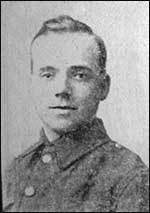 Rushden Echo, 21st May 1915, transcribed by Kay Collins Rushden Echo, 21st May 1915, transcribed by Kay Collins
Rushden Soldier Wounded - The Great Battle
‘Some Rushden Chaps Lying Dead’ – ‘Most of our Battalion Wiped Out’
Mrs E Harris, of Oakley-road, Rushden, has received new that her brother Pte Chas H Jeeves, 16671 D Company, 1st Northants Regt. has been wounded. His injuries, we understand are in his right hand and back, and he is now in the 3rd Southern General Hospital at Oxford and going on well. Prior to his enlistment last December, Pte Jeeves was employed in the office of the C.W.S. boot factory at Rushden. We are asked to state that the report which appeared in an evening contemporary that Pte Jeeves has wounds in the head are incorrect.
In a letter to Miss M Denton, 18, Grove-street, Rushden, Pte Jeeves says:- “No doubt you have received the postcard written by a friend and sent to you from France. I have a bullet wound in the right hand and another in the back. Needless to say, I am unable to write myself. I arrived at the above address yesterday afternoon. The weather here is very nice now. I received my wounds on Sunday morning last (May 9) in a charge, and I think I am lucky to get away with wounds as most of our battalion was wiped out. According to all accounts the 2nd Battalion fared likewise, so I don’t know how Jigger Clayton got on, but I trust he got through safely. I saw about a dozen Rushden chaps lying on the battlefield the same time as myself, and some of them were dead”.
|
Rushden Echo, 21st May 1915, transcribed by Kay Collins
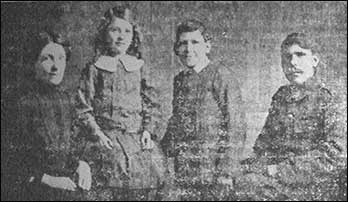 |
|
Pte Clayton and Family
|
A Rushden Steelback
Once Ill and Twice Wounded
For the third time Pte H Clayton (Rushden), of the “Steelbacks,” son of Mr and Mrs W Clayton, of Rushden, is in hospital. He has been once ill and twice wounded and is now in hospital in Coventry from the latter cause. This time he has been wounded in the back and shoulder. It is a strange coincidence that the first wound Pte Clayton was in back, and this missile struck him within two inches of his first wound, being received at about the same of day. These wounds, which were received in the battle of Aubers Ridge, are rather more serious than on the first occasion, as he has been struck by two missiles. After being struck in the back he was, we understand, crawling away when the second missile struck him, passing right through his shoulder. His comrades put him on one side and never expected him to recover, so we are informed, but we remember Pte Clayton saying to his mother on the last occasion he was home wounded: “Don’t worry, I shall come back. There isn’t a German born who can kill me.” And it seems that he spoke the truth, we are glad to say.
Pte Clayton’s wife sent to see him on Wednesday and found him progressing favourably and in good spirits, in fact he was much better that she expected to find. He considers that he is very lucky to get home alive.
|
Rushden Echo, 21st May 1915, transcribed by Kay Collins
News of Rushden Man Wanted by His Parents
Wymington Soldier Wounded
Mr and Mrs Wilson, of 168, Cromwell-road, Rushden, are anxious for news concerning their son, Pte Reg Wilson, of the 1st Northants, who it is feared, was wounded in the great battle of Aubers Ridge on Sunday, May 9. A postcard was sent to Pte Wilson by a friend and it has been returned marked “Unable to trace, wounded.”
Pte Harry West (Wymington), of the same regiment, who himself is wounded and is in hospital, has written to say that Pte Wilson was wounded almost as soon as he went into action. Pte West gave his pal a drink of water and was then compelled to leave him.
Mr and Mrs Wilson, who are naturally worried concerning their son, would be grateful for any details concerning him.
|
The Rushden Echo, 21st May, 1915, transcribed by Jim Hollis
Rushden Soldier Hurt - Private J. R. Cross Receives Two Wounds
Pte. J. R. Cross, aged 18, of the 1st Northants Regt., received two wounds at Aubers Ridge. Last week his parents, who live in Grove-road, Rushden, received the following letter:-
“We went into action on Saturday night, and our artillery opened fire on Sunday at 5 a.m. At 5.30 we had to charge over our trenches, and most of us got in between our line and the enemy’s line, and a lot went right up to the German trenches, to have a warm reception from them. I cannot think how I got through without going under. I had one bit of lead in my left arm, I think, but I am going sick this morning to see what it is; it’s nothing serious. The casualty list is heavy, I can tell you. We had to lie in the open from 5.30 a.m. to 8 p.m., nearly 15 hours, with Maxim guns, rifles, and shells on us all day long, with men going under right and left – some terrible sights I can tell you; but, thank God, I have got through all right. Then we had to crawl back to our lines and then back to our billets.”
The following letter reached his parents on Saturday:- “I have been wounded – not very much, one in the left arm and back; nothing to worry about. I got them on Sunday.”
|
Rushden Echo, 21st May 1915, transcribed by Kay Collins
Rushden Soldier Wounded — Lance-Corpl. Ray Tye - Now in Hospital
Mr and Mrs H Tye, of Moor-road, Rushden, have received information that their son, Lance-Corpl. Ray Tye, of the Northants Regiment, has been badly wounded, and is now in the 2nd Eastern Hospital, Brighton.
Lance-Corpl. Tye was in Australia when war was declared, and was called up as a reservist. Since being on active service he has been promoted to his present rank. He was sent to the front on Jan. 1st. Mrs Tye came from Australia about three weeks ago and is now residing with her husband’s parents at Rushden.
|
Rushden Echo, 21st May 1915, transcribed by Kay Collins
In the Thick of It — Another Rushden Soldier Wounded — “Not Many Left”
In several soldiers’ letters published in this issue mention is made that Private W Willis (Rushden), of the 1st Northants, has been wounded. This news is confirmed in a letter that Private Willis has sent to his father from the 3rd Northern General Hospital, Sheffield. He writes: “Just a few lines to let you know that I am getting on all right. I have got a bullet through the left arm. It’s not very bad. I did not expect to get to England with it, but I am here, and I expect I shall have a short leave before I go back, and then I can tell you all about it. You might let me know if ‘Poof’ (Private F Whiting) is all right, because I did not see him in the charge. F Tear is all right; he lay next to me when we dug ourselves in. I don’t think there were many of the battalion left by the way they were getting shot.”
|
The Rushden Echo, 21st May, 1915, transcribed by Jim Hollis
Reported Wounded - Rushden Soldier Hit
Pte. Sam Cowley (Rushden), of the Steebacks, who, in a letter from Pte. R. Reynolds published in this issue, is reported as having been hit, prior to leaving Rushden lodged with Mrs. Underwood, 40, Washbrook-road, Rushden. On Tuesday Mrs. Underwood had received no confirmation of Pte.Cowley’s wound other than that above mentioned.
|
The Rushden Echo, 21st May, 1915, transcribed by Jim Hollis
Rushden Recruit for The Royal Army Medical Corps
Mr. Arthur Stanley Knight (son of Mr. J. F. Knight, of the White House, Rushden) has joined the R.A.M.C. as a private. Having gone through a course of ambulance training, Mr. Knight is proceeding to a hospital in Birmingham for further training and will then be at the disposal of the Army authorities.
|
The Rushden Echo, 21st May, 1915, transcribed by Jim Hollis
Rushden Soldier Well? - Rumoured Injuries Apparently Unfounded - Private W. Dickens
Mrs. Stephen Dickens, of Rushden, has received a letter from her son, Pte. W. Dickens, of the 2nd Northants Regiment, who, it was rumoured about the town, had been wounded. We are pleased to state that the rumour is apparently unfounded, judging by the following letter which was received last Sunday. Pte. Dickens writes:-
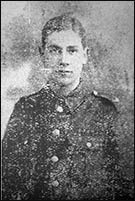 |
|
Pte Bob Sears
|
“Just a few lines to let you know that I am all right and in the best of health and hope you are all quite well at home. Young Bob Sears (son of Mr. and Mrs. Wm. Sears, 82, Wellingborough-road, Rushden), and Fred Bayes (son of Mr. and Mrs. Wm. Bayes, Irchester), were wounded last Sunday, but I am glad to say their wounds were not very serious. It is murder at times out here. I have been through one big charge last Sunday, when Bob was wounded. It wasn’t half hot stuff. I had a bullet through my puttees and a piece of shell grazed by thumb, so I am quite lucky. I had to lie on the German’s parapet for 14 hours, but they are frightened at our bayonets, and dare not come out. I wish they would – it would soon finish if they did. I got the papers, including the ‘Rushden Echo,’ all right last night and was pleased with them.”
Pte. Dickens’s father is also serving in His Majesty’s forces, having joined the colours since his son. He enlisted in the A.S.C. in February and is at present stationed a Fleet, near Aldershot.
|
The Rushden Echo, 28th May, 1915, transcribed by Jim Hollis
Rushden Soldier Promoted - Pte. William Linnitt - Made Lance-Corporal
It is with much pleasure that we have received the news that Private William (Billy) Linnitt, fourth son of Mr. and Mrs. John Linnitt, of 46, Lower Portland-road, has been promoted to the rank of Lance-Corporal. He enlisted as soon as the war broke out, and he has been stationed at Northampton and Shorncliffe in Kent, and is now at Aldershot. Pte.Linnitt is quite well, and is anticipating a few days’ leave of absence from duty and spending a few days with his relatives and friends at Rushden.
Mr. and Mrs. John Linnitt also have their third son, Pte. Ralph Linnitt, in the Army. Ralph enlisted also as soon as the war broke out. He was in Canada at the time war was declared, and he joined the Westminster Fusiliers now stationed at Hastings Park, Vancouver, B.C. He is quite well and is expected to come to England shortly with another contingent of the Canadian Forces, who have already done some brave deeds and won for themselves honour and glory. Rushden people will wish Lance-Corporal W. Linnitt and Pte. Ralph Linnitt God-speed and a safe return to their home.
|
The Rushden Echo, 4th June, 1915, transcribed by Gill Hollis
Rushden Seaman Proud - His Portrait in the “Rushden Echo”
96,000 Miles in 19 Months and Still “A Long Way To Tipperary”
Seaman Cyril Groome (Rushden), of H.M.S. Berwick, has forwarded another breezy letter to his parents and sister. He writes:-
“I am sorry to hear bread is so very dear in England. We are still as happy as the days are long, but it is rather cold up here for us after leaving the tropics. I am not allowed to tell you anything as regards the movements of our ship, but you can guess whereabouts we are. I was sorry to hear about Pte. James, who was reported missing from the battle of the Aisne. I see my photo and also Twelvetree’s are in the ‘Rushden Echo.’ I am proud of being mentioned.
“I am sending you a photo of our ship’s company after taking 1200 tons of coal. We are just having a ten minutes stand easy. Of course, you call it coal, but sailors have a nickname for coal. We call it black diamonds, and these black diamonds have taken our ship 96,000 miles in 19 months and we all sing after our 96,000 miles, ‘It’s a long way to Tipperary.’
“Our captain has been “called home,” so we shall miss a good captain. We are still coaling ship, another 1400 tons on Wednesday. On Thursday we spring-clean before we sail. Every time we coal ship in the middle of the week we always get two Saturdays, and then we get water on the brain.
“The routine for Saturdays is: Turn out of hammock, 5.30 a.m.; holystone deck till 8.0; breakfast, 9.0; fall in for holystone till 11; wash down and dry decks at 11 till 12; then dinner, salt pork and pea soup, and I can tell you that the salt pork was put in pickle in the time of Nelson, I think. Then comes the pea soup, but perhaps the cook has forgotten to put in soap! More skylarking. Thanks for the postcard of the special Police. It took me all day to find father’s photo on it, I don’t think.”
|
The Rushden Echo, 4th June, 1915, transcribed by Gill Hollis
Rushden Soldier Wounded
Pte. W. Starmer - Progressing Favourably
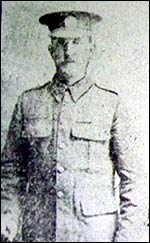 |
|
Pte W Starmer
|
Pte. W. Starmer (Rushden), of the 1st Northants Regt., was badly wounded in the right leg and in the head on May 9th, and is now in a London hospital where his wife has been to see him. We are pleased to say that he is progressing favourably. He told his wife that his regiment was badly cut up in the battle and there were very few answered the roll call afterwards. In a letter to his wife, which she received yesterday morning, he writes:
“I am pleased to tell you that my head is nearly healed up. I expect to have the bandage off in two or three days. I am getting a bit stronger on my right leg now but it is still numbed up to the thigh. I can walk about on it now. I am able to get about the grounds. I had a letter from Arthur (Arthur Freeman, son of Mr. and Mrs. C. Freeman, Rushden, and Mrs. Starmer’s brother) at Chatham and he told me he was going to the front to-day. I wish him the best of luck and hope he comes back quite safely. I haven’t had a letter from my pal at the front, so I can’t tell Mrs. Magee anything about Frank yet until I get a letter from him, but I expect it is about right about him. I shan’t be long before I come home now. I don’t think I shall be able to follow my same work again, but with a pension and a nice light job I think we shall be able to get along nicely, but I would sooner have the use of my leg back again. It don’t half seem funny with one leg and a swinger.”
|
Rushden Echo, 4th June 1915, transcribed by Kay Collins
Quick Work – Rushden Soldier’s Rapid Journey
Pte. Judd, 4th King’s Royal Rifles, formerly of North-street, Rushden, has been wounded. On Whit-Monday he went to the front, and was about a mile from the firing line. Next day, as he and three other soldiers were preparing a maxim gun, something struck him in the shoulder and face, and he has received nasty injuries. At 2 o’clock on the Thursday morning he was passing through Wellingborough M.R. Station on his way to Leicester Hospital. Pte. Judd was a scholar in the North-End School, Rushden, and of the Church Sunday school.
|
Rushden Echo, 4th June 1915, transcribed by Kay Collins
Wounded a Second Time
Private William Collins (Rushden), of the 2nd Northants, is again at home, having been wounded for the second time. On this occasion he has been wounded in the right ankle; on the first occasion it was in the left ankle. When he was at home in October last he accorded us an interview, but on this occasion he informed our representative that he wants to forget the war, at any rate, while he is at home. He sustained his present wound on May 9th at Aubers Ridge.
|
Rushden Echo, 4th June 1915, transcribed by Kay Collins
Won’t Come Out and Fight
Private F. Sugars (Rushden), of the 19th Hussars, in a letter to his brother, gives emphatic expression to some wholesome truths. He writes: “I am more than pleased to have the opportunity of replying to your letter after the terrible struggles we have been in during the last fortnight, but i thank God for bringing me through safe and sound with the exception of feeling the effects of gas we have had thrown at us when trying to put up a fair fight the cowards of Kaiser Bill’s, as they won’t come out and fight, and it’s simply torture for us with them using gas. I am not going to tell you anything of our last fight in the early hours of the 24th, as I have already written to mother, I want to forget it, but we have lost heavily in our regiment, numbering now only 110 out of 700 or 800 that we had when we came out here.
“We are not only fighting with unpleasant things as they come, out here, but with unpleasant times. Even when we take up a paper to read to pass an hour away, the first thing we see is 7,000 tram strikers somewhere in England. Why the devil don’t they give them a suit of khaki and a rifle and send them out here? Half a living in dear old England is far more comfortable than the odds we have to face at present. You can guess the heart it is putting in us out here!
“Then again there is the Cabinet affair. Ah, Well! I’m not a learned man, so I won’t say any more about that, but, at the same time we have our opinions, which might, of course, be very little in some people’s eyes.
“I hope and trust I shall have the pleasure of writing you once more before long, providing I don’t get another dose of gas. Bullets and shells are nothing now, but I do bar gas. After what we have been through, it does not make you fear—nothing but gas. When they turn the next lot on I hope God will turn the wind round and wipe the whole lot of them up.”
Writing to his father and mother under date May 25th he says:-
“I am more than pleased to have the opportunity of writing you these few lines after the most exciting time we have been getting again the last seven or eight days we have been in the trenches. We have been rather lucky to escape the gas, of which you have no doubt heard so much talk of, that the Germans are using, but on Monday morning between the hours of one and two, just as we were getting relieved, on it came. Talk about torture. I can’t describe to you what it is like. The devils won’t come out and fight. They sit in the trenches and laugh at the hundreds of poor fellows that cop out by it.
“Anyhow, we soon had our respirators on, which are a fine invention by our medical men, and our General, who is in charge of the brigade, and was colonel of our regiment at the time the war broke out, soon let us back after them in spite of the gas. You hear people talk of hell, but hell isn’t in it. It looked impossible for any man to live at all. How I came through it, God only knows, but here I am taking a few hours’ rest after a jolly rough time.
“I am sorry to say we have lost some fine officers and men. At present we number 110 out of a regiment. I have had several people when writing me ask how it is that our regiment hasn’t had many casualties. I wonder how this will do, but here we are just as happy again to think God has spared us. We lost all our squadron officers.”
In another letter, which evidently refers to the same engagement, he writes:
“Last night was welcomed very much after six days in the trenches, without any rest, as you can’t get rest in a trench very well. On Thursday we had the fight of our lifetime. The Germans made an attack on some of our line and managed to advance 200 or 300 yards, and that caused it. All the cavalry made a counter attack, and after them we went. Talk about ‘hell,’ as a remark, it isn’t in it. It seemed impossible for any man to live. Of course, we had a lot of casualties, and how I got through I don’t know. As far as I know there was only one killed from our county in my regiment, that I know well, and it was Corporal West, of Irchester. It may be several weeks before they hear from the War Office. I always found Corpl. West to be a jolly good chum. We haven’t got a list of casualties out yet, but as near as I can gather ours were something near 100. We lost all our officers in my squadron with the exception of two. We are taking a couple of days rest, and then we expect to be in again. Our horses are taking it easy about 20 miles back. Our Colonel was amongst the killed.”
|
The Wellingborough News, Friday 11 June 1915, transcribed by Nicky Bates
Rushden Man Wounded
Another victim of the Aubers Ridge battle is Pte E Knight, of the 1st Northants Regiment, whose parents reside in Cromwell-road, Rushden. This solider went through the Boer War without a wound and was still in the Army when the European war broke out. He had been at the front a long time when on May 9th, he was slightly wounded in the head and badly wounded in the right arm. He is now in Cleve Hospital, Bristol, and is making good progress.
|
Rushden Echo, 11th June 1915, transcribed by Kay Collins
Local Soldier Wounded - A Caldecott Steelback - Injured at Aubers Ridge
Mr and Mrs Joseph Knight, of 149, Cromwell-road, Rushden, have received news that their son Pte E Knight, of the Steelbacks, was wounded in the head and right arm on May 9th. The injured soldier, who was a militia man and resides at Caldecott when at home, fought throughout the Boer War, and came through that struggle unscathed. He was sent to the front at the commencement of the war and escaped injury until the battle of Aubers Ridge on May 9th. He is at present in hospital at Bristol.
|
The Rushden Echo, 18th June, 1915, transcribed by Gill Hollis
Bullets Flying About
Rushden Soldier at The Front - Meeting of Rushden Men
Lance-Corpl. John Souter (Rushden), 3rd Battalion Royal Fusiliers, writing to his sister says:
“I am all right so far. This is a rough show, but I have got through all right. I saw a chap Brown from Rushden. I believe he has been living at Luton. I also saw Harry Norman. They have both got good jobs out here. We marched about 25 miles – it played my feet up a bit. I managed to have a drink with Ted Brown; he was very good to me. He is ‘Rolly’ Brown’s brother. I got the ‘Rushden Echo’ all right. The sun is a bit warm here now. It’s just beginning to smell a bit here. I hope you are getting along all right with the Welsh Fusiliers. I took some of the Scots Fusiliers up to firing line just before we left the last place and I told them to keep their heads down, but one poor chap stopped it the next morning, clean through the head. We are a bit further away from them here, but it’s shells all day long. I am Orderly Corporal this week, and I have to take a party down the road at night to draw out rations. Bullets flying about everywhere. I don’t mind it much as long as you are all well at home.”
|
The Rushden Echo, 18th June, 1915, transcribed by Gill Hollis
A Good Family Record
Rushden Lady’s Three Brothers - Serving King and Country
Mrs. Herbert Charles Denton, of 1, Crabb-street, Rushden, has three brothers living, and they are all serving their King and country. One brother, Richard Lilleker, in the Royal Navy, is serving on H.M.S. Albermarle. He has been in the Navy several years, and has been taking his part in guarding the Channel. Another brother, Pte. Frank Lilleker, enlisted on the outbreak of war, and is now engaged in motor transport work with the Army Service Corps. The third brother is Gunner Ralph Lilleker, who, enlisting soon after the declaration of war – in September – is now with the Royal Field Artillery. He has been in training at Okehampton, Devon, and has just passed in firing. He expects shortly to be going to the front. They are the sons of Mr. Robert Lilleker, of the Victoria, Oundle, and before going abroad Gunner Ralph Lilleker paid a visit to Oundle a few days ago, his sister, Mrs. Denton, going to the Irthlingborough L. and N.W. station to see him for a few minutes. Mrs. Denton has a sister who married a soldier, and she also has a cousin now serving in the Dardenelles. This is a remarkable family record.
Mrs. Denton has just received an interesting letter from her brother, Pte. Frank Lilleker, in the course of which he says:-
“At last a line to let you know I have once more changed my address. I have changed to a different Company, so if you are writing to me the address is 55 Coy, G.H.Q. Troops Supply, L. of C. reserve lorries, A Section, B.E.F. I am still in the best of health and happy, though we are doing a bit more work than I have been doing. The food is still very good, but it is a fight to get it sometimes, as there are so many fellows here, and sometimes you have to start work again before finishing eating it, but I don’t suppose it will hurt anyone to do without a meal sometimes. I bet there are a good many in the Old Country get less than we do. There is no doubt the papers exaggerate when they say the A.S.C. get three or four courses at dinner. I have moved a bit farther from the firing line and a bit nearer to the coast, as I am at a repairing base with an old Daimler car which has been out a long time and has got knocked about, so I expect I have to stay here for a week or two, worse luck. I would rather be on the advance column – it is more exciting and you get about the country a bit. This is a very pretty place where we are. Our cars are standing in a large park with a grand chateau in the distance. Our boys had a half day off yesterday, we were playing cricket in the Park – not much like Sunday. The town is only about two minutes’ walk, so I have a walk up of an evening. It is very much like an English town, but the people jabber so, or seem to me so, I can’t get on with the language much.”
Note: Gunner Ralph Lilleker was killed in Belgium on 19th October 1917
|
The Rushden Echo, June 25th 1915, transcribed by Kay Collins
Rushden Hussar Injured – The result of an Accident - Four Days in Hospital
We are sorry to report that Pte. F. E. Sugars (Rushden), of the 19th Hussars, has been in hospital, having been injured. Although he has been at the front since the commencement of the war he has received no wounds, and his present injuries were not received in the firing line. In a letter to his parents he writes:-
“I am pleased to say I am out of hospital. I was only in four days, though it was my own doings in getting out so quick. It was nothing serious, though at first we all thought I was off for good. We were jumping our horses the other day and, of course, after making much of my horse since we have been back from the trenches, he dropped me at the pole jump, and when he got me down he thought he would roll on me a couple of times so, of course, I am almost ‘out’ when they extracted me from under him. I am going on all right, but it will be a week before I can put my leg to the saddle, though I can walk on it”.
|
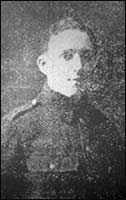 |
|
Pte H Cater
|
The Rushden Echo, 25th June, 1915, transcribed by Gill Hollis
Rushden Soldier Wounded - For a Second Time
Also a Sufferer From Poison Gas
News has been received by Mrs. Head, Orchard-place, Rushden, that her son, Private H. Cater (Rushden), of the 1st Battalion Beds Regt., has been wounded for the second time, and is in hospital in London. In a letter to his sister he says he has been injured in the back and arms. Just prior to receiving these injuries, Pte. Cater had been in hospital for three weeks, suffering from the effects of German poison gas, this having caused abscesses to form on his face. He is but 18 years of age, and joined the colours two years ago, being sent from Ireland to the front on the outbreak of war.
Mrs. Head has two other sons serving in His Majesty’s forces, viz., Bombardier R. Head, of the R.F.A., who has been at the front since the beginning of the war, and Corpl. William Head, of the 1st Grenadier Guards, who is at present in England.
|
The Rushden Echo, 25th June, 1915, transcribed by Gill Hollis
Rushden Hussar Honoured
Corporal Percy Colson - Mentioned in Despatches
It is with the greatest pleasure that we record the interesting and gratifying news that Corpl. J. Percy Colson (Rushden), of the 4th Hussars, son of Mrs. William Colson, of Wellingborough-road, Rushden, is mentioned in Sir John French’s latest dispatches. About five months ago Corporal Colson was at home on three days’ leave from the front, and on that occasion he accorded us an interesting interview which was published in our columns. Corpl. Percy Colson is well known in the town and district, being an old Wellingburian. He enlisted about four years ago, and prior to joining the regular forces saw service with the Northants Yeomanry. His brother, Frank, is also serving in His Majesty’s forces, being with the forces in German South West Africa.
|
|